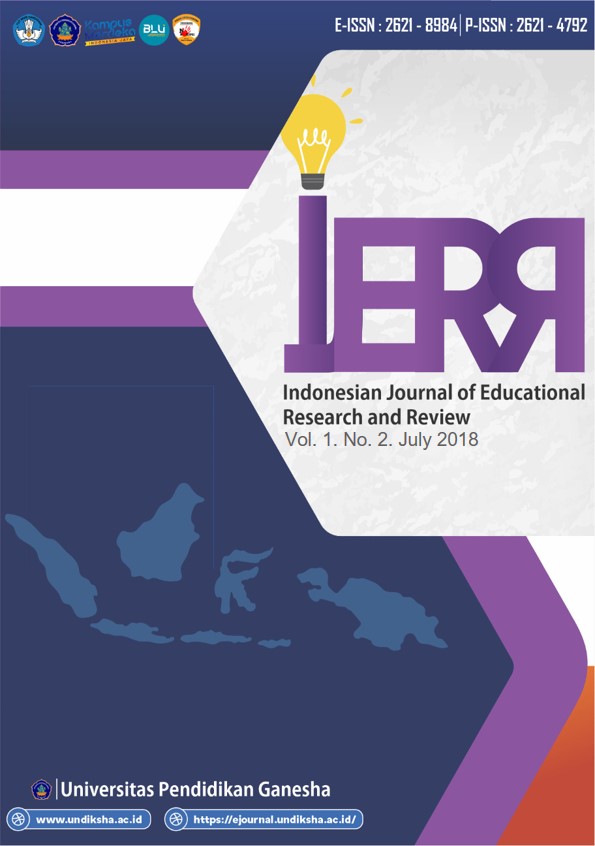PENGARUH MODEL PEMBELAJARAN DISCOVERY LEARNING BERBASIS PENILAIAN PORTOFOLIO TERHADAP KOMPETENSI PENGETAHUAN MATEMATIKA SISWA KELAS IV
DOI:
https://doi.org/10.23887/ijerr.v1i2.14707Abstrak
This study is aim to determine the effect of discovery learning model besed on portofolio of mathematies knowledge competencies of IV grade students of elementary school Gugus II Kuta Utara academic year 2017/2018. This research is an quasi experiment design with Nonequvalent Control Group Design. Population in this research were all students of IV elementary school Gugus II Kuta Utara academic year 2017/2018 as many as 277 students. The sample of this research is the IV grade student of elementary school No. 3 canggu as experimental class and IVC grade student of elementary school No. 1 Tububeneng as control class with the total of each group as much as 30 students after equalized by matching technique. The method of data collection in this research is test method, with the usual double choice test amount of 30 items that have been validity. The data analysis using t-test shows that there is were significant differences of students mathematics knowledge competency which is learned by using discovery learning model besed on portofolio and students who ware taught by using conventional learning in IV grade students of elementary school Gugus II Kuta Utara academic year 2017/2018. This is evidensed by the (thitung = 2,683 > ttabel = 2,021) at the significant of 5% with dk n1+n2-2 (30+30-2=56) and the average competency value of mathematics knowledge of students experimental group 73,50 and the average of competence value of mathematic knowledge of student control group 64,40. Thus, it can be concluded that the application of discovery learning model besed portofolio influence the knowledge competence of mathematics IV grade in elementary school Gugus II Kuta Utara academic year 2017/2018Referensi
Agung, A.A. Gede. 2014 Metodologi Penelitian Pendidikan. Malang: Aditya Media Publishing.
Candra, Anak Agung Bagus Trisna Adi. 2017. Pengaruh Model Discovery Learning Terhadap Kompetensi Pengetahuan IPA Siswa Kelas VI SD Gugus Yos Sudarso Kecamatan Denpasar Selatan. Vol 5 No 2. E-journal PGSD Universitas Pendidikan Ganesha. (diakses pada tanggal 28 Februari 2018).
Dantes, Nyoman. 2012. Metode Penelitian. Yogyakarta: Andi
Darmadi, Hamid. 2014. Metode Penelitian Pendidikan dan Sosial. Bandung: Alfabeta.
Kosasih. 2014. Strategi Belajar dan Pembelajaran Implementasi Kurikulum
Bandung: Yrama Widya.
Permendikbud. 2013. Nomor 81A Tentang Implementasi Kurikulum Dengan Rahmat Tuhan Yang Maha Esa. Jakarta: Permendikbud.
Permendikbud. 2014. Nomor 57 Tentang Kurikulum 2013 Sekolah Dasar/Madrasah Ibtidaiyah. Jakarta: Permendikbud.
Sari, Ni Made Meita Purnama. 2017. Pengaruh Model Discovery Learning Terhadap Hasil Belajar Matematika Siswa Pada Kelas V Sd Gugus II Kecamatan Mendoyo. Vol 5 No 2. E-journal PGSD Universitas Pendidikan Ganesha. (diakses pada tanggal 28 Februari 2018).
Setyosari, Punaji. 2013. Metode Penelitian Pendidikan & Pengembangan. Jakarta: Kencana.
Sugiyono. 2011. Metode Penelitian Pendidikan Pendekatan Kuantitatif, Kualitatif, dan R&B. Bandung: Alfabeta.
Sugiyono. 2013. Metode Penelitian Pendidikan Pendekatan Kuantitatif, Kualitatif, dan R&B. Bandung: Alfabeta.
Unduhan
Diterbitkan
Cara Mengutip
Terbitan
Bagian
Lisensi
Authors who publish with the Indonesian Journal of Educational Research and Review (IJERR) agree to the following terms:
- Authors retain copyright and grant the journal the right of first publication with the work simultaneously licensed under a Creative Commons Attribution-ShareAlike 4.0 International License. that allows others to share the work with an acknowledgment of the work's authorship and initial publication in this journal.
- Authors are able to enter into separate, additional contractual arrangements for the non-exclusive distribution of the journal's published version of the work (e.g., post it to an institutional repository or publish it in a book), with an acknowledgment of its initial publication in this journal.
- Authors are permitted and encouraged to post their work online (e.g., in institutional repositories or on their website) prior to and during the submission process, as it can lead to productive exchanges, as well as earlier and greater citation of published work. (See The Effect of Open Access)









